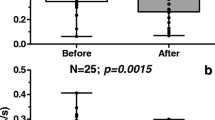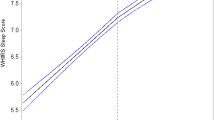Abstract
The purpose is to examine the effects of melatonin supplementation on sleep, mood, and hot flashes in postmenopausal breast cancer survivors. In a randomized, double-blind, placebo-controlled study, 95 postmenopausal women with a prior history of stage 0–III breast cancer, who had completed active cancer treatment (including hormonal therapy) were randomly assigned 1:1 to either 3 mg oral melatonin (n = 48) or placebo daily (n = 47) for 4 months. Sleep, mood, and hot flashes were assessed at baseline and 4 months via self-administered questionnaire using the Pittsburgh Sleep Quality Index (PSQI), Center for Epidemiologic Studies—Depression (CES-D), and the North Central Cancer Treatment Group (NCCTG) hot flash diary, respectively. Eighty-six women (91 %) completed the study and provided pre- and post-questionnaires. At baseline, 52 % of participants reported poor sleep in the month prior to enrollment. Compared to subjects on placebo, subjects randomized to melatonin experienced significantly greater improvements in subjective sleep quality as measured by the PSQI, including domains on sleep quality, daytime dysfunction and total score. For example, the mean change in PSQI score was −0.1 in the placebo group compared to −1.9 in the melatonin group (p < 0.001). There were no significant differences in measures of depression or hot flashes. Sleep disturbances are common among breast cancer survivors, even after completion of active cancer treatment. This is the first randomized placebo-controlled study among breast cancer survivors to demonstrate that melatonin was associated with an improvement in subjective sleep quality, without any significant adverse effects.
Similar content being viewed by others
Abbreviations
- CBT:
-
Cognitive behavioral therapy
- CES-D:
-
Center for Epidemiologic Studies-Depression
- DFCI:
-
Dana-Farber Cancer Institute
- ER:
-
Estrogen receptor
- IGF:
-
Insulin-like growth factor
- MENQOL:
-
Menopause Specific Quality of Life
- MT1:
-
Melatonin receptor 1
- NCCTG:
-
North Central Cancer Treatment Group
- PSQI:
-
Pittsburgh Sleep Quality Index
References
Fiorentino L, Ancoli-Israel S (2006) Insomnia and its treatment in women with breast cancer. Sleep Med Rev 10(6):419–429
Buscemi N, Vandermeer B, Hooton N, Pandya R, Tjosvold L, Hartling L, Vohra S, Klassen TP, Baker G (2006) Efficacy and safety of exogenous melatonin for secondary sleep disorders and sleep disorders accompanying sleep restriction: meta-analysis. BMJ 332(7538):385–393
Herxheimer A, Petrie KJ (2002) Melatonin for the prevention and treatment of jet lag. Cochrane Database of Systematic Reviews
Cardinali DP, Srinivasan V, Brzezinski A, Brown GM (2012) Melatonin and its analogs in insomnia and depression. J Pineal Res 52(4):365–375
Bellipanni G, Bianchi P, Pierpaoli W, Bulian D, Ilyia E (2001) Effects of melatonin in perimenopausal and menopausal women: a randomized and placebo controlled study. Exp Gerontol 36(2):297–310
Iguichi H, Kato KI, Ibayashi H (1982) Age-dependent reduction in serum melatonin concentrations in healthy human subjects. J Clin Endocrinol Metab 55(1):27–29
Jung B, Ahmad N (2006) Melatonin in cancer management: progress and promise. Cancer Res 66(20):9789–9793
Mills E, Wu P, Seely D, Guyatt G (2005) Melatonin in the treatment of cancer: a systematic review of randomized controlled trials and meta-analysis. J Pineal Res 39(4):360–366
Schernhammer ES, Giobbie-Hurder A, Gantman K, Savoie J, Scheib R, Parker LM, Chen WY (2012) A randomized controlled trial of oral melatonin supplementation and breast cancer biomarkers. Cancer Causes Control 23(4):609–616
Buysse DJ, Reynolds CF 3rd, Monk TH, Berman SR, Kupfer DJ (1989) The Pittsburgh Sleep Quality Index: a new instrument for psychiatric practice and research. Psychiatr Res 28(2):193–213
Hann D, Winter K, Jacobsen P (1999) Measurement of depressive symptoms in cancer patients: evaluation of the Center for Epidemiological Studies Depression Scale (CES-D). J Psychosom Res 46(5):437–443
Radloff LS (1977) The CES-D scale: a self-report depression scale for research in the general population. Appl Psychol Measure 1:385–401
Sloan JA, Loprinzi CL, Novotny PJ, Barton DL, Lavasseur BI, Windschitl H (2001) Methodologic lessons learned from hot flash studies. J Clin Oncol 19(23):4280–4290
Courneya KS, Sellar CM, Trinh L, Forbes CC, Stevinson C, McNeely ML, Peddle-McIntyre CJ, Friedenreich CM, Reiman T (2012) A randomized trial of aerobic exercise and sleep quality in lymphoma patients receiving chemotherapy or no treatments. Cancer Epidemiol Biomarkers Prev 21(6):887–894
Payne JK, Held J, Thorpe J, Shaw H (2008) Effect of exercise on biomarkers, fatigue, sleep disturbances, and depressive symptoms in older women with breast cancer receiving hormonal therapy. Oncol Nurs Forum 35(4):635–642
Yurcheshen ME, Guttuso T Jr, McDermott M, Holloway RG, Perlis M (2009) Effects of gabapentin on sleep in menopausal women with hot flashes as measured by a Pittsburgh Sleep Quality Index factor scoring model. J Womens Health (Larchmt) 18(9):1355–1360
van Geijlswijk IM, Korzilius HP, Smits MG (2010) The use of exogenous melatonin in delayed sleep phase disorder: a meta-analysis. Sleep 33(12):1605–1614
Alfano CM, Lichstein KL, Vander Wal GS, Smith AW, Reeve BB, Mc Tiernan A, Bernstein L, Baumgartner KB, Ballard-Barbash R (2011) Sleep duration change across breast cancer survivorship: associations with symptoms and health-related quality of life. Breast Cancer Res Treat 130(1):243–254
Otte JL, Carpenter JS, Russell KM, Bigatti S, Champion VL (2010) Prevalence, severity, and correlates of sleep-wake disturbances in long-term breast cancer survivors. J Pain Symptom Manage 39(3):535–547
Berger AM, Kuhn BR, Farr LA, Von Essen SG, Chamberlain J, Lynch JC, Agrawal S (2009) One-year outcomes of a behavioral therapy intervention trial on sleep quality and cancer-related fatigue. J Clin Oncol 27(35):6033–6040
Epstein DR, Dirksen SR (2007) Randomized trial of a cognitive-behavioral intervention for insomnia in breast cancer survivors. Oncol Nurs Forum 34(5):E51–E59
Savard J, Simard S, Ivers H, Morin CM (2005) Randomized study on the efficacy of cognitive-behavioral therapy for insomnia secondary to breast cancer, part II: immunologic effects. J Clin Oncol 23(25):6097–6106
Secreto G, Chiechi LM, Amadori A, Miceli R, Venturelli E, Valerio T, Marubini E (2004) Soy isoflavones and melatonin for the relief of climacteric symptoms: a multicenter, double-blind, randomized study. Maturitas 47(1):11–20
Kotlarczyk MP, Lassila HC, O’Neil CK, D’Amico F, Enderby LT, Witt-Enderby PA, Balk JL (2012) Melatonin osteoporosis prevention study (MOPS): a randomized, double-blind, placebo-controlled study examining the effects of melatonin on bone health and quality of life in perimenopausal women. J Pineal Res 52(4):414–426
Hickie IB, Rogers NL (2011) Novel melatonin-based therapies: potential advances in the treatment of major depression. Lancet 378(9791):621–631
Lissoni P, Barni S, Mandala M, Ardizzoia A, Paolorossi F, Vaghi M, Longarini R, Malugani F, Tancini G (1999) Decreased toxicity and increased efficacy of cancer chemotherapy using the pineal hormone melatonin in metastatic solid tumour patients with poor clinical status. Eur J Cancer 35(12):1688–1692
Lissoni P, Barni S, Meregalli S, Fossati V, Cazzaniga M, Esposti D, Tancini G (1995) Modulation of cancer endocrine therapy by melatonin: a phase II study of tamoxifen plus melatonin in metastatic breast cancer patients progressing under tamoxifen alone. Br J Cancer 71(4):854–856
Lissoni P, Chilelli M, Villa S, Cerizza L, Tancini G (2003) Five years survival in metastatic non-small cell lung cancer patients treated with chemotherapy alone or chemotherapy and melatonin: a randomized trial. J Pineal Res 35(1):12–15
Lissoni P, Paolorossi F, Ardizzoia A, Barni S, Chilelli M, Mancuso M, Tancini G, Conti A, Maestroni GJ (1997) A randomized study of chemotherapy with cisplatin plus etoposide versus chemoendocrine therapy with cisplatin, etoposide and the pineal hormone melatonin as a first-line treatment of advanced non-small cell lung cancer patients in a poor clinical state. J Pineal Res 23(1):15–19
Dillon DC, Easley SE, Asch BB, Cheney RT, Brydon L, Jockers R, Winston JS, Brooks JS, Hurd T, Asch HL (2002) Differential expression of high-affinity melatonin receptors (MT1) in normal and malignant human breast tissue. Am J Clin Pathol 118(3):451–458
Cos S, Fernandez R, Guezmes A, Sanchez-Barcelo EJ (1998) Influence of melatonin on invasive and metastatic properties of MCF-7 human breast cancer cells. Cancer Res 58:4383–4390
Cos S, Sanchez-Barcelo EJ (2000) Melatonin and mammary pathological growth. Front Neuroendocrinol 21(2):133–170
Grant SG, Melan MA, Latimer JJ, Witt-Enderby PA (2009) Melatonin and breast cancer: cellular mechanisms, clinical studies and future perspectives. Expert Rev Mol Med 11:e5
Sanchez-Barcelo EJ, Cos S, Mediavilla D, Martinez-Campa C, Gonzalez A, Alonso-Gonzalez C (2005) Melatonin–estrogen interactions in breast cancer. J Pineal Res 38(4):217–222
Jablonska K, Pula B, Zemla A, Owczarek T, Wojnar A, Rys J, Ambicka A, Podhorska-Okolow M, Ugorski M, Dziegiel P (2013) Expression of melatonin receptor MT1 in cells of human invasive ductal breast carcinoma. J Pineal Res 54(3):334–345
Acknowledgments
We are grateful to the participants of this trial, as well as to the staff at the Dana-Farber Cancer Institute that helped facilitate the trial’s conduct. This study was supported by a grant from the National Cancer Institute (R03 CA123597). The funding source had no role in the design or analysis of the study or in the decision to submit the manuscript for publication.
Conflict of interest
The authors declare that they have no conflict of interest.
Author information
Authors and Affiliations
Corresponding author
Rights and permissions
About this article
Cite this article
Chen, W.Y., Giobbie-Hurder, A., Gantman, K. et al. A randomized, placebo-controlled trial of melatonin on breast cancer survivors: impact on sleep, mood, and hot flashes. Breast Cancer Res Treat 145, 381–388 (2014). https://doi.org/10.1007/s10549-014-2944-4
Received:
Accepted:
Published:
Issue Date:
DOI: https://doi.org/10.1007/s10549-014-2944-4




